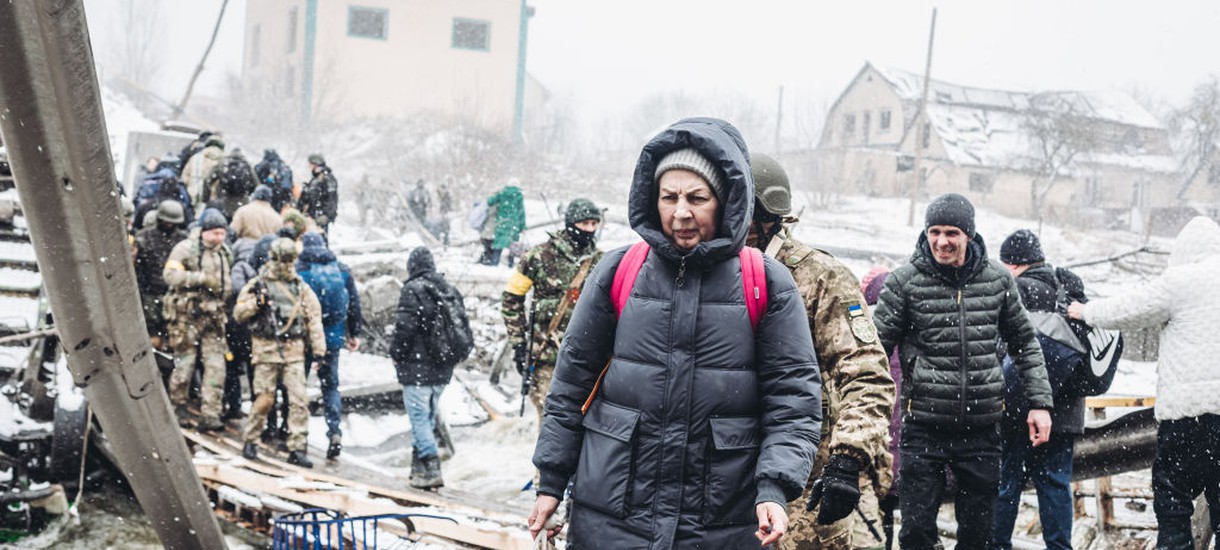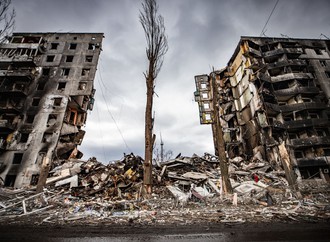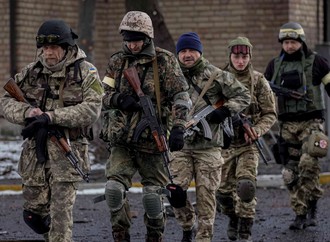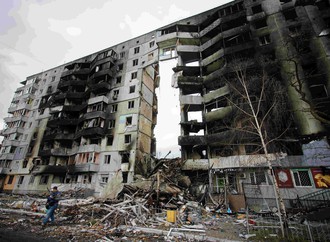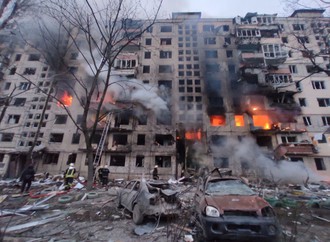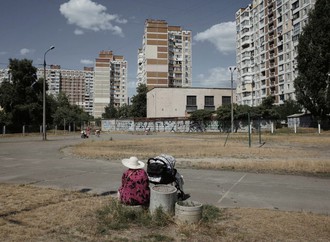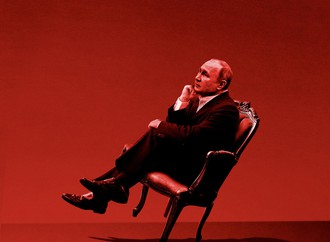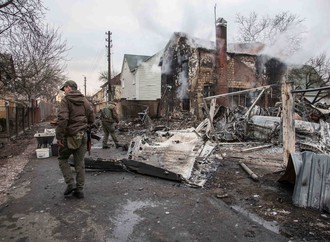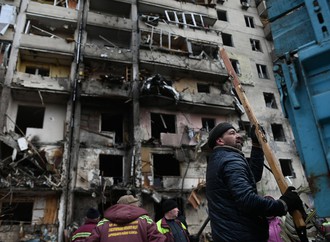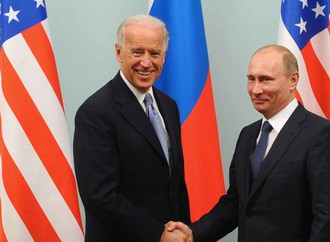The Russian invasion of Ukraine is a crime and a human tragedy. There are already some 2 million refugees, as bombs and missiles rain down on cities around Ukraine. Early setbacks for the invading forces have often fed the idea that Vladimir Putin’s actions have backfired. Yet Ukrainians face the prospect of a long and drawn-out war, with no end in sight even despite their stiff military resistance.
Volodymyr Artiukh is a Ukrainian anthropologist specializing in labor and migration in the post-Soviet space. Jana Tsoneva asked him about Putin’s imperial agenda, the last eight years of war, and what hopes exist of a viable peace process.
How is the war related to the post-2014 outbreak of civil war?
Briefly, the Maidan protests of 2013–14, Russia’s subsequent annexation of Crimea, and support of the uprising in Donbas led to a change in the geo-economic and geopolitical orientation of Ukraine. Ukraine signed an association agreement with the European Union, changed its cultural and political orientation in favor of Euro-Atlantic structures, and abandoned the idea of integration with the Russian project of an economic and political union. Russia reacted to this by consolidating an anti-Western narrative.
The Crimea annexation, which was largely bloodless, led to a boost in Putin’s domestic popularity. Then, he hoped to capitalize on the uprising in Donbas, which was an uprising against the change of government in Kiev. This uprising was construed as self-defense of the “Russian world” against Western-supported Ukrainian nationalists. Ukraine was increasingly represented as a failed state with an illegitimate Western-controlled government that terrorizes Russian speakers. All these ideological elements are present now as Putin’s justification of the invasion: denazification, demilitarization, decommunization.
Did the new government in Kiev do something to them to trigger this uprising in the East?
This was a revolt that started essentially in a similar way to the Maidan — as a grassroots mobilization, with barricades and takeover of local governments in several eastern cities. Initially it was a purely negative phenomenon — against something rather than for something. But soon, guys with a particular mix of the Russian-imperialist ideology and Soviet nostalgia — hoping for a union with Russia and inspired by the annexation of Crimea — took over this local uprising.Their idea was to spread the uprising to the rest of south-eastern Ukraine, which they called Novorossiya, referring to the time of the Russian Empire. Russia eventually integrated these semi-independent warlords into the Russian security apparatus. This led to an attempt of the Kiev government to take back Donbas in summer 2014 with the so-called anti-terrorist operation.
It was a war waged against the rebels, who were already quite pro-Russian and fought for an independence from Ukraine and for integration with Russia. Eventually Russian troops entered there on several occasions in 2014 and 2015. These incursions led to very significant defeats of the Ukrainian army with significant loss of life and equipment, which forced the Ukrainian government to sign the Minsk agreements.
Eventually, the spread of the uprising to Ukraine more widely faltered — but it was still mobilized by Russia to redirect the Ukrainian government as a whole, to use the self-proclaimed “people’s republics” as a leverage against Kiev’s pro-Western orientation. The Minsk agreements were essentially a diplomatic expression of the Russian military superiority; Russian military victory was translated into this diplomatic document. These agreements basically complemented the fighting rather than stopping it.
Did the Ukrainian government honor these agreements?
Neither side honored them — the divergence of interpretations emerged almost instantly. The agreements were not meant, in hindsight, to stop the war but to contain the military action, to dampen the contradictory interests of Ukrainian and Russian elites, to contain the military action so that the parties could regroup and prepare for the next round of fighting.
So, the ceasefire, which was only one part of the agreements, ebbed and flowed. At times, there was almost a full-fledged war; at times almost a real ceasefire, for example for almost half a year since summer 2020. The rhythm of the military action accompanied political negotiations. Ultimately these agreements were just a diplomatic break on the war, not its negation.
Volodymyr Ishchenko writes that only 20 percent of Ukrainians approved of joining NATO in 2007, doubling to 40 percent after the Crimea annexation, but still not the majority. So, what precipitated the geopolitical shift around 2013 and Maidan?
It’s true that prior to the Maidan of 2013, Ukrainian society was quite polarized; there was no majority in favor of either Russian or EU integration, much less in favor of NATO. The cause of the Maidan uprising was internal rather than geopolitical; it started as a popular uprising against an extremely corrupt and authoritarian regime, but eventually these contradictions of Ukrainian society were capitalized on by the oligarchs, also for electoral ends.
The Maidan uprising was quickly hijacked to streamline the popular discontent into this pro-EU pro-NATO straitjacket.
So, the Maidan uprising was quickly hijacked by one of these fractions to streamline the popular discontent into this pro-EU pro-NATO straitjacket. A whole stratum of self-organized volunteers, paramilitary groups, NGOs, political adventurers, and intellectuals emerged after Maidan, who combined nationalism, neofascism, economic liberalism, and “Occidentalism” — a loose idea of the Western civilization. This was amplified by Western soft power and a network of NGOs — the familiar story.
So, the more the conflict progressed along these lines — with Russia also playing its role in amplifying this conflict with its own imperialist ideology — people’s perception was increasingly put in these very narrow confines: either the West or Russia.
Nevertheless, there was still a silent majority in whose common sense these questions were rather superficial. For them, these were not the major concerns, but they didn’t have another way of speaking of their problems publicly. This majority elected Volodymyr Zelensky in 2019. He promised to end the war, to not press the issues of identity and language. He appealed to the good sense of the majority while glossing over these divisive issues.
But he also constitutionalized the new geopolitical orientation of Ukraine.
Yes, a year into his tenure as a president, he changed direction. Initially he was accused of being pro-Russian, accused of preparing to capitulate to Russia. But as essentially every president of Ukraine does, he tried to concentrate as much power as he could. He had to defeat his nationalist enemies, attract their constituency, and became this Napoleonic figure that balanced the Right and Left, pro-Russians and pro-Europeans, and at one of the turns he got stuck in the pro-Western nationalist corner. And at this point, everything collapsed.
And now the war has only radicalized this position?
Yes, the war changed everything.
We discussed the Russian involvement in the run-up to the war — so what was NATO’s role?
Look, there are Russia-NATO relations that stretch back to 1991 and back to the Soviet-NATO confrontation. This is one level. But I would insist on separating this from a second layer which is Ukraine-Russia-NATO. You can’t reduce the one thing to the other.
Ukrainian NATO membership wasn’t really on the table, right?
Yes. And in the recent diplomatic talks, before the war, Joe Biden was willing to entertain the possibility for a moratorium on Ukrainian NATO membership. He stressed that NATO would not be involved in the conflict between Ukraine and Russia. Among other powerful Western powers, such as France and Germany, nobody seriously considered Ukraine joining.
Did Russia use NATO’s expansion as a fig leaf then?
Definitely. Take, for example, the ultimatum which Foreign Minister Sergei Lavrov issued back in December about rolling back NATO’s border to the pre-1997 period. The call to decide literally the next day meant that no one could see this as a good faith negotiation. I think the idea of going to war in Ukraine, one way or another, was already there and they needed the war itself as a negotiating mechanism. They wanted to use war as a way of getting information from the West, like, what is the highest level of escalation that the West can afford? How far can we — Russia — go? What can we do in our backyard, and how far can they go in response?
Why would they want to know that?
Because that’s not the end of the matter. Because they think ahead. If you listen to Russia’s officials and read their ideological manifestos, if you read people who interpret Russian foreign policy decision makers in the Kremlin — they see these apocalyptic events coming. They see the world changing to the core. They see that we live in the new world and Russia needs to find its place otherwise it will be eaten by these predators, by China or the US. They’re reasoning along the lines of “we need to act now, it’s now or never, there is time and it will either be glorious or we perish.” They also hope that they will join China in a sort of alliance. And they already need to mark their territory. The logic is: “There’s seven bad years ahead, but then we’ll have our hundred years of empire.” This is the frame of mind, if you read closely what the Russians are saying.
Left-leaning media emphasize NATO’s role — but your reading makes me think that the talk about NATO was some kind of fake excuse for Russia.
It was not. Let’s put it this way, in the long-term perspective of the last three decades. For Putin and for his very tight-knit elite group, it was real: NATO pushing right up to the border was a defeat for them. Most of NATO’s expansion happened on Putin’s watch, except for the first round. The rest of it happened on his watch. Of course, he talks about Russia’s interest in geopolitical terms. But he also sees it as his personal defeat, a matter of his legitimacy, not only in the eyes of average Russians, but in the eyes of the elite.
But didn’t Russia want at some point to join?
Putin said something like this, but it wasn’t serious. The broader problem, if we leave aside his perception of threats, was that the West did not manage to inscribe Russia in a more comprehensive security agreement and all of the bilateral and multilateral agreements. So, for Putin, partly it was this defeat that needs to be corrected now.
Like when he speaks of 1991 as a “catastrophe.”
Yes, and this long-term perspective had a caricatural representation in Lavrov’s ultimatum, seeking to solve the whole problem in a matter of two months. What he said was that NATO was going to Ukraine and was about to station weapons there: a hysterical spectacle, a performance of all these grievances. But this diplomatic spectacle was not meant to resolve this thirty-year-old problem.
So, the war in Ukraine is not a direct consequence of NATO expansion. It’s Russia’s proactive step to change, to break this structure of power relations in which Russia existed. It was not reactive in the sense of an immediate threat, it was a predator’s attack at the moment when, according to the Kremlin, the enemy was at its weakest. The diplomatic spectacle was a distraction.
Let’s talk about the liberal take on the situation that Putin wants to recreate the old “Soviet empire” in its former borderlands.
Let’s just abandon this ridiculous idea that Putin wants to restore the Soviet Union. Listen to Putin himself — he spent half his speech castigating Lenin.
And promised the “decommunization” of Ukraine.
Yes, exactly. For him, decommunization means destroying this “affirmative action empire” that was the USSR. Putin wants to destroy the economic and national units that the USSR created throughout its history. He wants to essentially rebuild the Russian empire with one imperial center. Not necessarily within the boundaries of the old, but with a similar power structure of one imperial center resting on an oppressive apparatus without any hegemonic ideology that mobilizes people from below.Hegemonic leadership implies concession to the partners in the hegemonic power bloc, as the Soviet Union did, making some concessions to the nationalities. Putin is not interested in hegemony. He’s interested in building this “vertical power” that begins and ends with the Kremlin. This is a very different thing to the Soviet Union. You need only look at how Putin talks to his Security Council, like to schoolchildren who failed their homework assignment. Compared to that, the Communist Party was a shining example of direct democracy.
When the invasion happened on February 24, you wrote that you had seen it coming. How did you do so?
The process that led to the war was already visible in the first war scare of April 2021, when the first Putin-Biden meeting happened after Russia piled up troops on the border with Ukraine. Back then, everyone expected a war to happen at that point.
But instead, Putin and Biden started talks on strategic stability and Putin made some claims regarding Ukraine, especially about the Minsk agreements. Nominally the troops were withdrawn from the borders after this meeting, but everyone knew that a substantial number remained. However, immediately after that Putin talked about the red lines, the asymmetric response if the lines are crossed; then he wrote his Ukraine article, which was essentially an ultimatum directed at Zelensky. This article was the draft of his war declaration speech that we saw in two parts over February 22 and February 24. It was probably recorded in one go.
So, after the Putin-Biden meeting in 2021, the military infrastructure and substantial numbers of weapons remained at the border. There was a surge in September and October with a large-scale military exercise, the Zapad (“West”) exercise, when the number of troops exceeded those that are now active in Ukraine, and these exercises were explicitly about taking over Ukraine. They did it as an exercise. Simultaneously, the breakaway regions of Donbas were all but integrated into Russia. More than half a million inhabitants gained Russian citizenship. The leaders of these republics got membership of the Russian ruling party.
Only wishful thinkers assumed that Putin would still want to go ahead with the Minsk process. By that time it was clear that even if Putin went along with Minsk, it would mean a war by other means, because the process implies that Ukraine reintegrates these territories, but they were de facto already integrated into Russia. They had their own military and so on, but being constitutionally integrated into Ukraine, they would have a free hand in the rest of the territory where they would clash with Ukrainian nationalists. In Ukraine, an internal revolt would have happened against such an implementation of the Minsk agreements, anyway. So, the Minsk process was another name for dismembering Ukraine and war in slow motion.
Ukraine has been treating them like foreign lands: it doesn’t pay pensions, social payments, all these financial and fiscal ties have been cut. I mean, can they ever go, or do they even want to go back? There’s also the issue of the language.
I don’t think it was feasible, even before the war. Ukraine’s elites were already resigned to the fact that these were not their territories and the elite in these breakaway republics never thought that they would join Ukraine. When Putin recognized their independence, there was briefly a sigh of relief among Ukraine’s elites. They didn’t know the war was coming. Until the last moment, they didn’t believe that there would be war. But they were relieved that they had finally gotten rid of these troubled regions.
The West reacted to the war with sanctions which the media called unprecedented. Do you think the sanctions are going to stop Putin or will there be a world war?
The sanctions will not stop the war. Only tanks and guns can stop tanks and guns.
Well, these tanks and guns need fuel and ammo and only money can buy them. How are they going to finance the war if it drags on?
I’m talking about a long-term perspective. If the sanctions remain for years, probably we will see this effect. And even that is not given because we don’t know how China will react, but in the short term, there is no way the sanctions will impact the course of the war.
How about the antiwar movement in Russia? Is there any hope that Russians themselves will take down the regime and put an end to the war?
No. The majority of the population in one way or another support the war. That’s clear now.
Really? The Levada Center registered only 40 percent support for the war.
The latest polls show a much higher percentage.
Aren’t they government-controlled?
Yes, there are issues with polls in Russia because the rate of nonresponses is very high. So, we probably aren’t accounting for a huge share of the population who for one reason or another refuse to respond. But let’s say that there is an indication that opponents of the war are a minority. Moreover, there is no political structure behind them, because the structure was destroyed in recent years. Add to that the immense increase in the repressive apparatus in Russia and the institutionalization of censorship. The antiwar movement is necessary, of course, it is a good thing, we need to support and increase cooperation with those Russian scholars and activists and we need to fight xenophobia against them. But this is for the future.
What needs to be done in the short term, now that people are under fire and running away?
Try to help the refugees and relieve the evolving humanitarian disaster in Ukraine. Western governments should not only think about supplying weapons and so on, but of canceling Ukraine’s foreign debt, providing economic assistance, and how to help to achieve ceasefires to get people out from under the bombs. They need to think about what’s going to happen with Ukraine’s economy very soon and how it’s going to impact the world food market.
These are the things that we can do and Western governments can do. They can, of course, influence the military action there. They are doing this, but now it ultimately depends on Ukrainians’ willingness to fight, which is now quite considerable. Even the Russian-speaking Ukrainians are rallying around the flag.
Do you see the West sending armies at some point?
This will not happen. They are sending guns and anti-tank weapons, and there is talk of sending warplanes — I don’t know whether that will materialize or not. This won’t change the strategic picture. It helps to drag on and postpone Russia’s victory. It’s better to fight with an anti-tank missile than with your bare hands.
But if it drags on, what are the Ukrainians to do?
There will be a slow takeover of Ukraine by Russia, city by city, with immense destruction and with immense suffering.
Yes, but it can’t be ruled out that, at some point, Russia will sink all its resources in Ukraine. Actually, Russia already seems to be running out of resources and will need to mobilize its economy and then more recruits, reservists and so on, and that will likely significantly change the picture inside Russia. Probably it will have a negative impact, much more negative than the sanctions, but it remains to be seen. I remain pessimistic in regards to the outcome of this war. I still don’t think that Ukraine’s army can prevail. As to whether Putin can achieve his goals of regime change: definitely not. There is no way he can sustain a stable pro-Russian regime.
Because there would be another Maidan followed by another invasion?
Yes, and you see this already — in Russian-speaking cities, mind you — with peaceful protests in the cities captured by the Russians. There is an army. There are attacks on the streets, yet people take to the protests unarmed. If this is happening now, it’s definitely going to happen to any regime Putin may install.
Is there a way out for Putin?
I don’t think he knows himself. It’s this situation when you jump into the fight and then you see — that’s what they did. They miscalculated gravely. They thought that the Ukrainian army would fold and that the people would come with flowers to cheer, but this didn’t happen.
The West also risks losing face. I didn’t see any appetite for war in the West last year, neither from the US — which explicitly said we don’t need trouble in Europe, we need to focus on China — nor from the EU. That’s also part of the reason why Putin did it because he saw that the West was not ready to deal with a war. You remember Emmanuel Macron making a fool of himself proclaiming that, oh, I brought peace and the week after Putin invaded. So, the West can’t do anything, to be honest. The war, unfortunately, has to be fought out between the Ukrainian and Russian army. The balance of power on the battlefield will decide pretty much everything else. And there is no good news. It’s just death and death and death.
One final question concerning knowledge production in war. You have criticized US-centric paradigms trying to explain the conflict. I agree with you that when they talk about the war, Americans have a tendency to talk mostly about themselves. What kind of frameworks do we need to begin to understand this war?
I think we need to take a break analyzing the US hegemony, because we know pretty much everything about it already, and very little about how Russia came to be like this beyond this cliché caricature that American scholars paint of Putin and Russia.
Some parts of the Left also needs to abandon the idea that Russia is somehow a continuation of the Soviet Union, or that it is the underdog in the imperialist fight that needs to be supported. We need to pay closer attention to what Russian scholars have done. We need to think more deeply about how the Kremlin guys picture themselves, what they imagine is happening around them and what may motivate them beyond what the West imagines is rational. Clearly their goals and the way they work is different than we imagine. We need to pay attention to the internal dynamics in the Ukraine-Russia relations. This is not something we know a lot about beyond the simplistic Western portrayal of the good democratic Ukraine versus the terrible authoritarian Russia or the evil Nazi Ukraine versus the eternally mistreated Russia.
We need much closer cooperation with the Left in Ukraine, Russia, and the West, which has not been happening beyond occasional meetings. Because the Left is a bearer of some knowledge, limited knowledge, but some unusual and probably insightful knowledge about the situation. A lot of people on the Left in Russia and Ukraine will need concrete material help, and they need understanding, because the fog of war destroys rational and critical thinking, and you need to be patient with people who make mistakes and will make mistakes. It’s impossible not to make a mistake when bombs are falling and your friends are dying.
